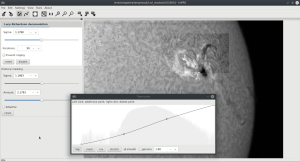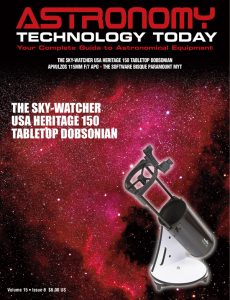ImPPG is an image post processoring program that performs Lucy-Richardson deconvolution, unsharp masking, brightness normalization and tone curve adjustment. It can also apply previously specified processing settings to multiple images. All operations are performed using 32-bitfloating-point arithmetic.
 A new version of the software has recently been released with new features including a German translation. ImPPG Supports input the following formats: FITS, BMP, JPEG, PNG, TIFF (most of bit depths and compression methods), TGA and more. Images are processed in grayscale and can be saved as: BMP 8-bit; PNG 8-bit; TIFF 8-bit, 16-bit, 32-bit floating-point (no compression, LZW- or ZIP-compressed), FITS 8-bit, 16-bit, 32-bit floating-point.
A new version of the software has recently been released with new features including a German translation. ImPPG Supports input the following formats: FITS, BMP, JPEG, PNG, TIFF (most of bit depths and compression methods), TGA and more. Images are processed in grayscale and can be saved as: BMP 8-bit; PNG 8-bit; TIFF 8-bit, 16-bit, 32-bit floating-point (no compression, LZW- or ZIP-compressed), FITS 8-bit, 16-bit, 32-bit floating-point.
ImPPG can also align an image sequence, with possibly large and chaotic translations between images (aligned output images preserve number of channels and bit depth). This can be useful, for example, when preparing a solar time-lapse animation, where subsequent frames are offset due to inaccurate tracking of the telescope mount. Other possible applications are smoothing out of terrestrial landscape time-lapses or preparing raw frames (with serious image jitter) for stacking.
ImPPG is free and open-source, licensed under GNU GPL v3 (or later). Building from source code (C++) requires Boost, wxWidgets and (optionally) FreeImage & CFITSIO libraries and is possible on multiple platforms. Windows executables (32- and 64-bit) can be downloaded using the links below. See the README file for details on usage and building. You can learn more here.
 And to make it easier for you to get the most extensive news, articles and reviews that are only available in the magazine pages of Astronomy Technology Today, we are offering a 1 year magazine subscription for only $6! Or, for an even better deal, we are offering 2 years for only $9. Click here to get these deals which only will be available for a very limited time. You can also check out a free sample issue here.
And to make it easier for you to get the most extensive news, articles and reviews that are only available in the magazine pages of Astronomy Technology Today, we are offering a 1 year magazine subscription for only $6! Or, for an even better deal, we are offering 2 years for only $9. Click here to get these deals which only will be available for a very limited time. You can also check out a free sample issue here.

